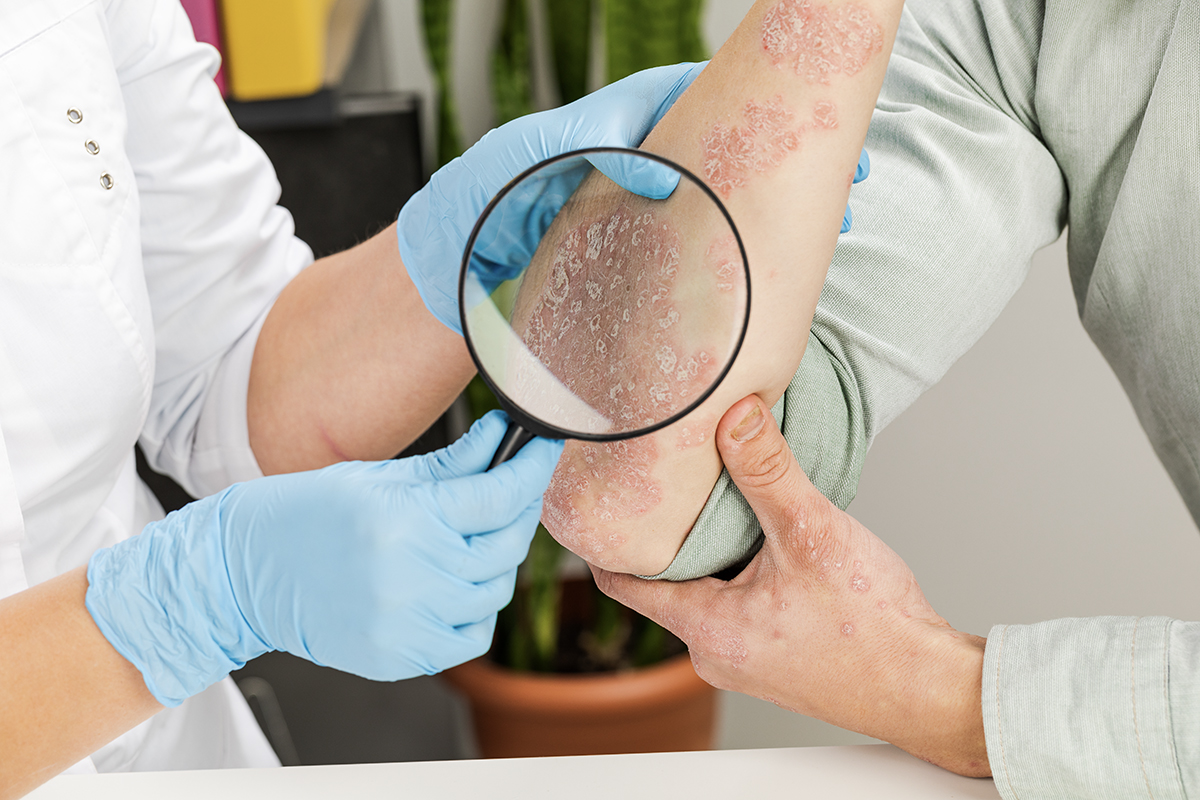Psoriasis is a chronic, inflammatory skin disease that affects millions of people worldwide. It manifests primarily as red, scaly patches on the skin, which can appear on various parts of the body. Although the exact cause of psoriasis is not known, it is believed to be an autoimmune disease in which the immune system attacks healthy skin cells, causing them to multiply excessively and rapidly.
Symptoms of psoriasis
- Psoriasis can range in severity from mild, small patches to severe cases involving large areas of skin. Typical symptoms include:
- Red, scaly patches that can occur on the scalp, elbows, knees, back and other areas;
- dry, cracked skin that is often accompanied by itching and pain;
- thick, silvery scales that form on the surface of the spots and may flake off;
- thick, misshapen nails, often with altered colour;
- psoriatic arthritis, which causes pain and stiffness in the joints.
Causes of psoriasis
Psoriasis is a complex disease and its causes are not fully understood. However, it is known that both genetic and environmental factors influence its development. Families with a history of psoriasis have a higher risk of developing the disease, suggesting a strong genetic basis. Genes responsible for the immune system may be behind the triggering and exacerbation of psoriasis symptoms.
Environmental factors, such as stress, often become a major trigger for psoriasis and can also lead to its worsening. Infections, especially bacterial infections, can trigger the seeding of psoriatic lesions. Other reasons for the appearance of skin lesions can be trauma, i.e. cuts, abrasions, sunburn or surgery. It is also worth being aware that the symptoms of psoriasis can be exacerbated by certain medications, including beta-blockers used to treat high blood pressure and lithium used to treat bipolar affective disorder.
Hormonal changes, such as those associated with pregnancy, menopause or puberty, can affect the course of psoriasis. It is important to avoid factors that exacerbate the disease, such as smoking and excessive alcohol consumption.
Diagnosis and treatment of psoriasis
The diagnosis of psoriasis is usually based on a thorough physical examination and assessment of the skin lesions by a dermatologist. The characteristic red, scaly patches on the skin often allow the disease to be easily diagnosed. In some cases, to confirm the diagnosis, the doctor may order a skin biopsy, which involves taking a small section of skin for microscopic examination.
Treatment of psoriasis is individually tailored to the patient and may include a variety of methods, depending on the severity of the disease. In mild cases, topical medications such as ointments and creams containing corticosteroids, vitamin D, retinoids or salicylic acid are mainly used. These medications help to reduce inflammation, exfoliate dead skin cells and slow down excessive cell growth.
Phototherapy, i.e. irradiation of the skin with UVB rays or PUVA (a combination of psoralen and UVA radiation), is used in moderately advanced cases of psoriasis. This method can be very effective, but requires regular visits to a dermatologist.
In severe cases of psoriasis, when other treatments are ineffective, oral medications and biologics are used. These drugs act on the immune system to reduce inflammation and slow the excessive growth of skin cells. The most commonly used substances are adalimumab, etanercept and ustekinumab. These drugs can have serious side effects, so their use requires close monitoring by a doctor.
Everyday life with psoriasis
Living with psoriasis can be a challenge, but there are many ways to manage it and improve your quality of life. It is important to look after your skin regularly, using the right moisturisers and treatments to help reduce dry and itchy skin. Avoiding triggers and exacerbators such as stress, skin trauma, certain medications and irritants is essential to keep symptoms under control.
Following your doctor's advice is extremely important. Regular check-ups, taking prescribed medication and participating in treatment programmes help to keep the disease under control and prevent flare-ups. It is also helpful to lead a healthy lifestyle - stick to a healthy diet, ensure regular physical activity and avoid stimulants such as alcohol and cigarettes.
Mental and emotional support is just as important as physical support. Talking to loved ones, joining support groups or consulting a psychologist can help to manage stress and improve wellbeing. Understanding that psoriasis is a chronic disease that can be lived with and function normally is fundamental to maintaining a positive attitude and quality of life.

